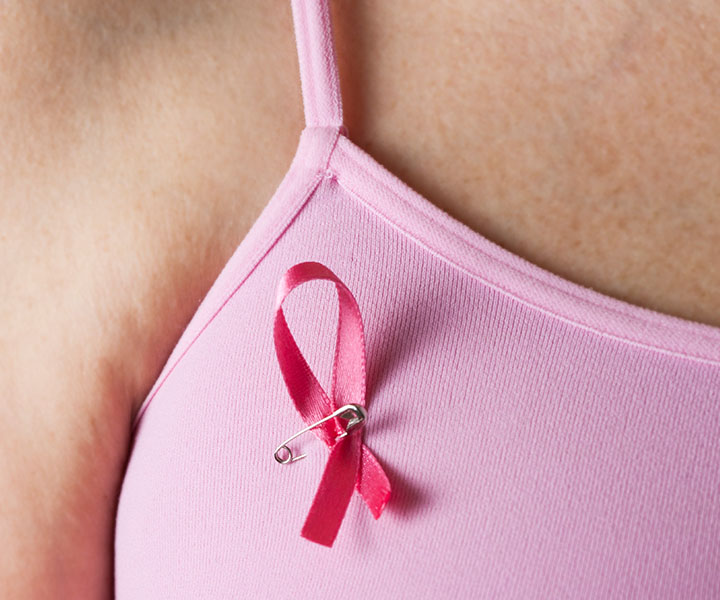Breast cancer prevention and screening
28 April 2025 | Comment(s) |
Emma Raposo

In Switzerland, some 6,000 women are affected by breast cancer every year, the majority over the age of 50. While the number of cases is increasing in all age groups, the trend is more marked in younger women.
Preventing and screening for breast cancer at an early stage can prevent the disease from developing, make it possible for any abnormality to be detected more quickly and, therefore, increase the chances of recovery. Let us take a look at these aspects in our blog article.
An increasingly common disease...
The number of people with breast cancer is rising throughout Europe. In Switzerland, a study of 60% of the population revealed a slight increase in the incidence of breast cancer between 1996 and 2009 in women up to the age of 49. The increase was greater among women aged 20 to 39. But what exactly is breast cancer?
According to the World Health Organization (WHO), breast cancer is a disease characterised by the uncontrolled growth of abnormal breast cells that form tumours. These mammary cancer cells originate in the milk ducts and/or lobules that produce milk. Breast cancer presents a wide range of pathologies, depending on the individual affected, and requires treatment tailored to each case. Thanks to prevention and early detection, cases of breast cancer can be treated more quickly and more effectively.
...that strikes at an increasingly early age

Breast cancer accounts for 33% of all cancers in women. The proportion rises to 40% in young women. The rise in the number of cases at all ages can be partly explained by the increase in screening and ever more effective diagnoses.
But how can we explain the causes of an earlier onset of cancer? There is no single answer, as there are so many factors involved. You'll find the main ones in this article. Preventive measures can reduce the risk of exposure to this breast disease.
Effectiveness of screening programmes
Breast cancer screening programmes play a crucial role in reducing mortality from the disease. By detecting tumours at an early stage, these programmes considerably improve the chances of recovery and reduce the need for invasive treatment.
In Switzerland, breast cancer screening programmes are organised at cantonal level, with major disparities between regions however. In the canton of Zurich, for example, there is no breast cancer screening programme. While some countries, such as Sweden, have introduced screening from the age of 40, in Switzerland screening begins at the age of 50, with a mammogram recommended every two years. If your canton of residence allows it, take the lead in women's health and take part in a breast cancer screening programme!
Towards early detection?
Early detection of breast cancer is essential if a medical diagnosis is to be made early enough to increase the chances of survival. In Switzerland, thanks to screening programmes, around 70% of breast cancers are now detected at an early stage.
Tumours detected at an early stage are often smaller and less aggressive, which means they can be treated less severely (and not heavy treatments as mastectomy, for example) and reduces the side-effects of drugs. On average, screening prevents four deaths from breast cancer for every 1,000 women who takes part in the programme over a twenty-year period.

Breast cancer screening methods
There are various methods of screening for breast cancer. These practices are particularly crucial at different ages, as they help to prevent complications associated with advancing age and maintain an optimum quality of life. Screening and prevention therefore often go hand in hand when it comes to breast cancer.
- Mammograms: mammograms are the most commonly used screening method for detecting breast cancer in Switzerland. They enable the internal structures of the breast to be visualised and any abnormalities (tumours or microcalcifications) to be detected, which cannot always be identified by palpation.
Screening mammograms make it possible to detect breast cancer at an early stage, which considerably increases the chances of survival and reduces the need for invasive treatment. If necessary, mammograms are supplemented by breast MRIs, which help to refine the diagnosis. - Self-examination: a quick and easy method that all women can carry out regularly to detect potential abnormalities. It is recommended that you carry out this examination every month after your period, when your breasts have reached their usual size and appearance.
- Other clinical examinations: health check-ups such as blood tests, physical examinations and other screening tests are essential for maintaining good health and preventing serious illness. Clinical examinations enable any health problems to be detected quickly so that a diagnosis can be made, increasing the chances of effective treatment and recovery.

What are the risk factors?
A number of risk factors can contribute to the development of breast cancer, including genetic and environmental ones. These include:
- Genetic predisposition and family history.
- Excessive alcohol consumption, smoking and lack of exercise.
- Contraception is an aggravating factor. Taking the pill increases the risk of developing breast cancer by around 20%.
- Elements linked to reproductive history: the greater the number of menstrual cycles, the greater the likelihood of developing cancer. The onset of menstruation at an early age can also increase the risk, as the body is exposed to hormones for a longer period.
The Breast Cancer Risk Assessment tool makes it possible to determine, by answering a few questions, whether a woman has an above-average risk of developing breast cancer. The good news is that mortality rates have fallen. Switzerland is even one of the countries with the best prognosis: 88% survival at five years, all age groups combined, according to figures from the Swiss Cancer League.
Breast cancer prevention

So what can you do on a day-to-day basis to prevent breast cancer? Here are a few preventive tips to keep in mind that can help detect potential abnormalities as early as possible.
- A healthy lifestyle is essential. In other words, it's best to avoid smoking, have a moderate alcohol consumption and take part in sporting activities, while adopting a balanced diet. This is a basic health prevention technique for many illnesses.
- Carry out regular check-ups and examinations with your gynaecologist and do not hesitate to inform him/her of any risk factors, such as family history.
- Carry out regular breast self-examinations from the age of 20 to help detect any abnormalities that may appear over the years
It is less often mentioned, but breastfeeding helps to protect against breast cancer, as do multiple and early pregnancies. The more pregnancies a woman has had, the lower her risk of developing the disease. Also, a first pregnancy before the age of 30 could reduce the risk of breast cancer compared with a pregnancy at an older age.
Symptoms to watch out for
As mentioned earlier, it is important to see your gynaecologist regularly, to carry out preventive self-examinations and to take risk factors into account. This is true even if you are following a screening programme. You should also look out for the characteristic symptoms of breast cancer, such as:
- a lump in the breast
- changes to the skin, an orange peel appearance, redness
- heat localised to an area
- pain in the area
- nipple discharge
- breast deformity
Early medical diagnosis of the disease helps to increase the chances of recovery and makes the disease less of a burden for sufferers.
Groupe Mutuel and women's health
Groupe Mutuel is committed to breast cancer awareness and prevention, and to women's health in general. Groupe Mutuel's PrimaFlex model is the first basic insurance in Switzerland to focus on the prevention of this disease.
This means, for example, that certain breast cancer screening tests are reimbursed by the insurance company with no deductible, regardless of age or canton of residence. To access this service, women insured with PrimaFlex can call our telemedicine partner, who will use questions to check whether they have an above-average risk of breast cancer. They can also go directly to their gynaecologist if they prefer.

Groupe Mutuel has also decided to support the “discovering hands method” implemented by the pretac+ association by covering part of the cost of this service through certain supplemental insurance policies. This tactile breast cancer screening is carried out by visually impaired or blind women trained by the association as Medical Tactile Examiners. People with impaired vision develop a heightened sensitivity to touch, and this project transforms their disability into a precious ability that helps save lives.
Groupe Mutuel also supports innovative approaches in the field of FemTech. For example, the Tech4Eva start-up acceleration programme, co-founded by Groupe Mutuel and the EPFL Innovation Park, has supported the creation of Palpa, a Chilean start-up dedicated to early detection through self-palpation, a programme based on AI to help diagnose breast cancer after a mammogram, and a new treatment table that allows women to undergo radiotherapy lying on their stomach, making it more effective, reducing the exposure of healthy tissue to radiation and improving their well-being.
Information to remember
- In Switzerland, breast cancer affects 6,000 women every year, with an increase among young women. 1 in 8 women will be affected by breast cancer in their lifetime.
- Prevention raises awareness of the disease and increases the chances of avoiding developing it, while screening enables any abnormalities to be detected at an early stage and the progression of the disease to be stopped.
- In Switzerland, breast cancer screening programmes are organised depending on your canton and play an essential role in reducing mortality and complications from the disease. Find out whether you can take part in a cantonal screening programme, where mammograms are exempt from the deductible amount.
- Gynaecological check-ups, regular self-examinations and a healthy lifestyle are important for preventing breast cancer and detecting any abnormalities.
- Regularly monitor the symptoms common to breast cancer.






